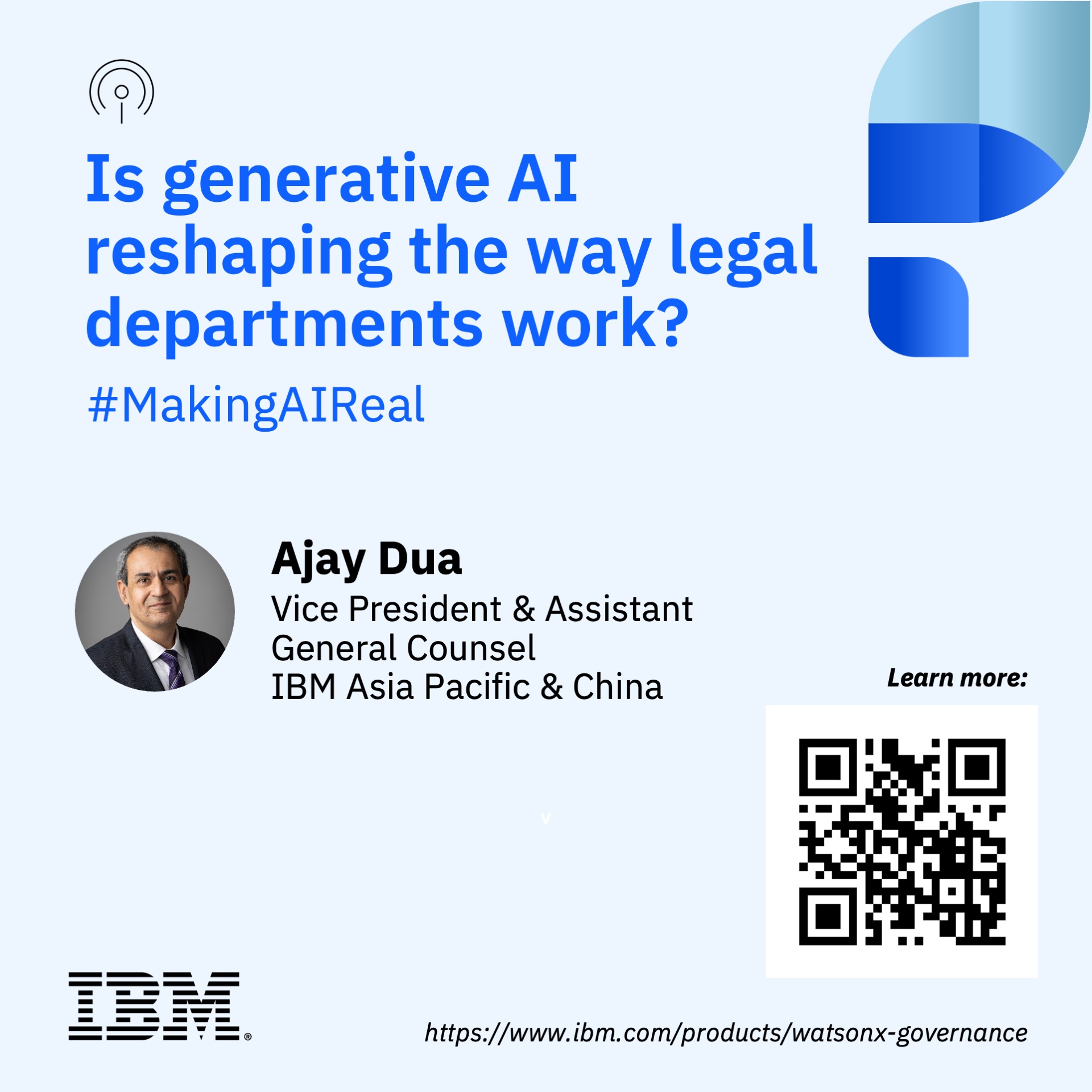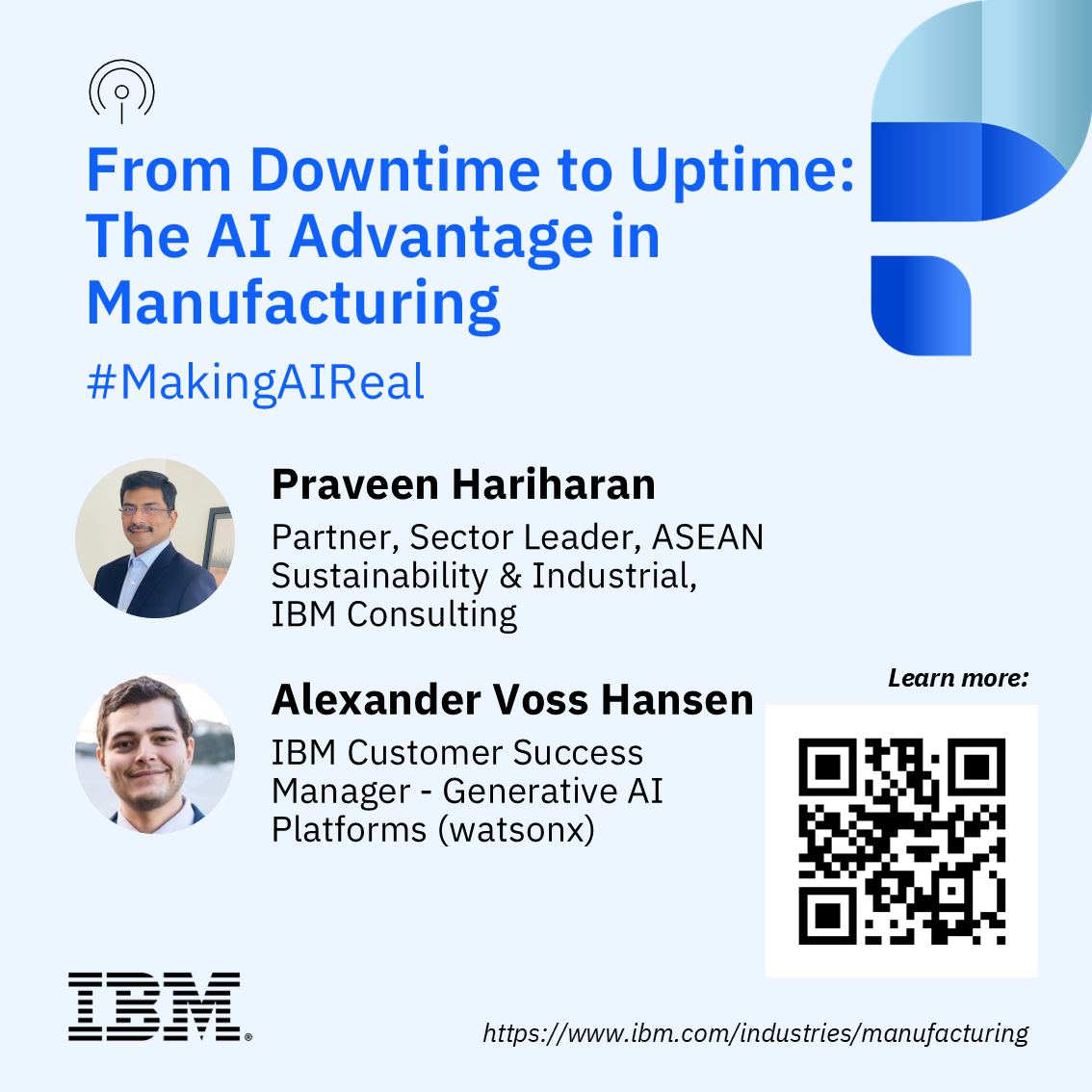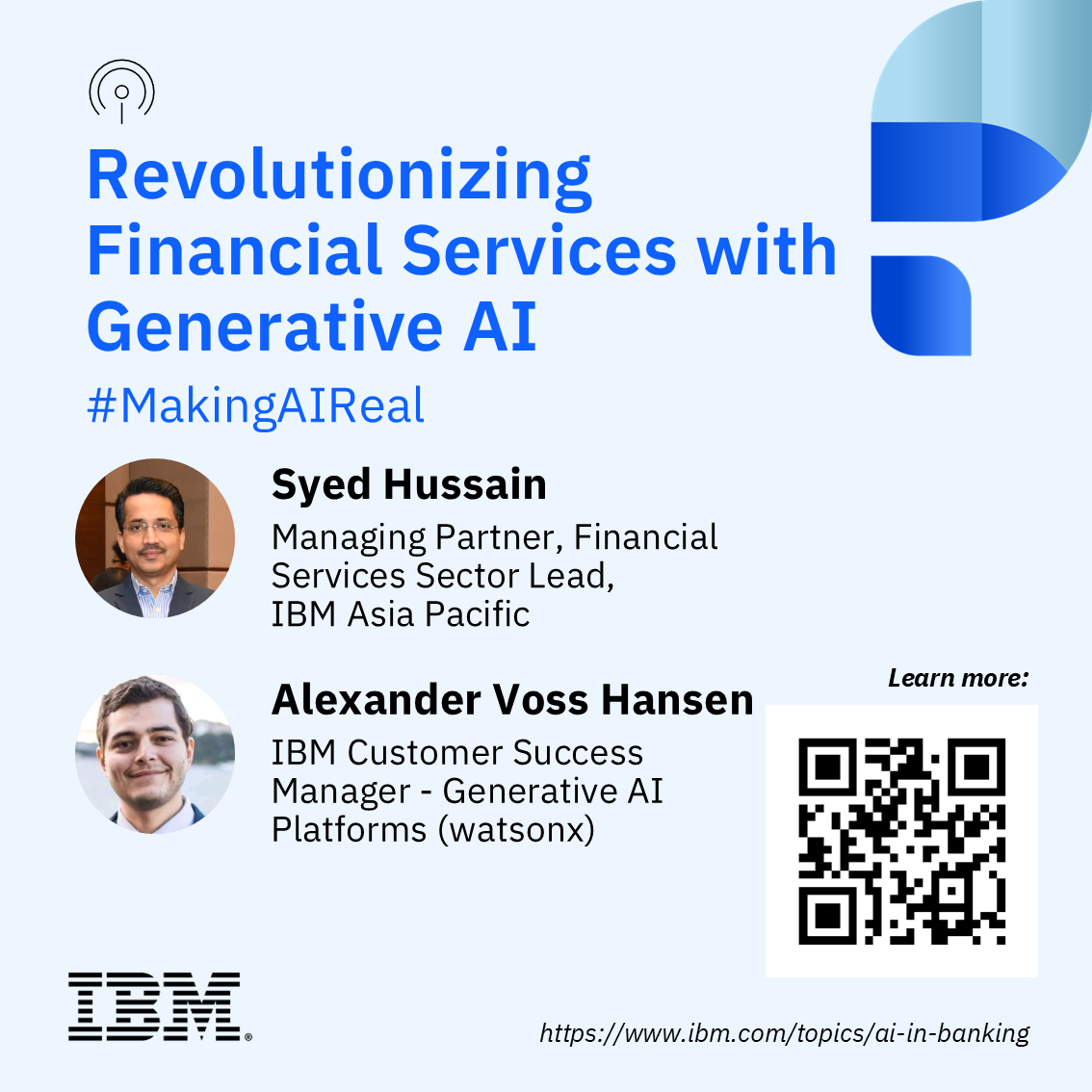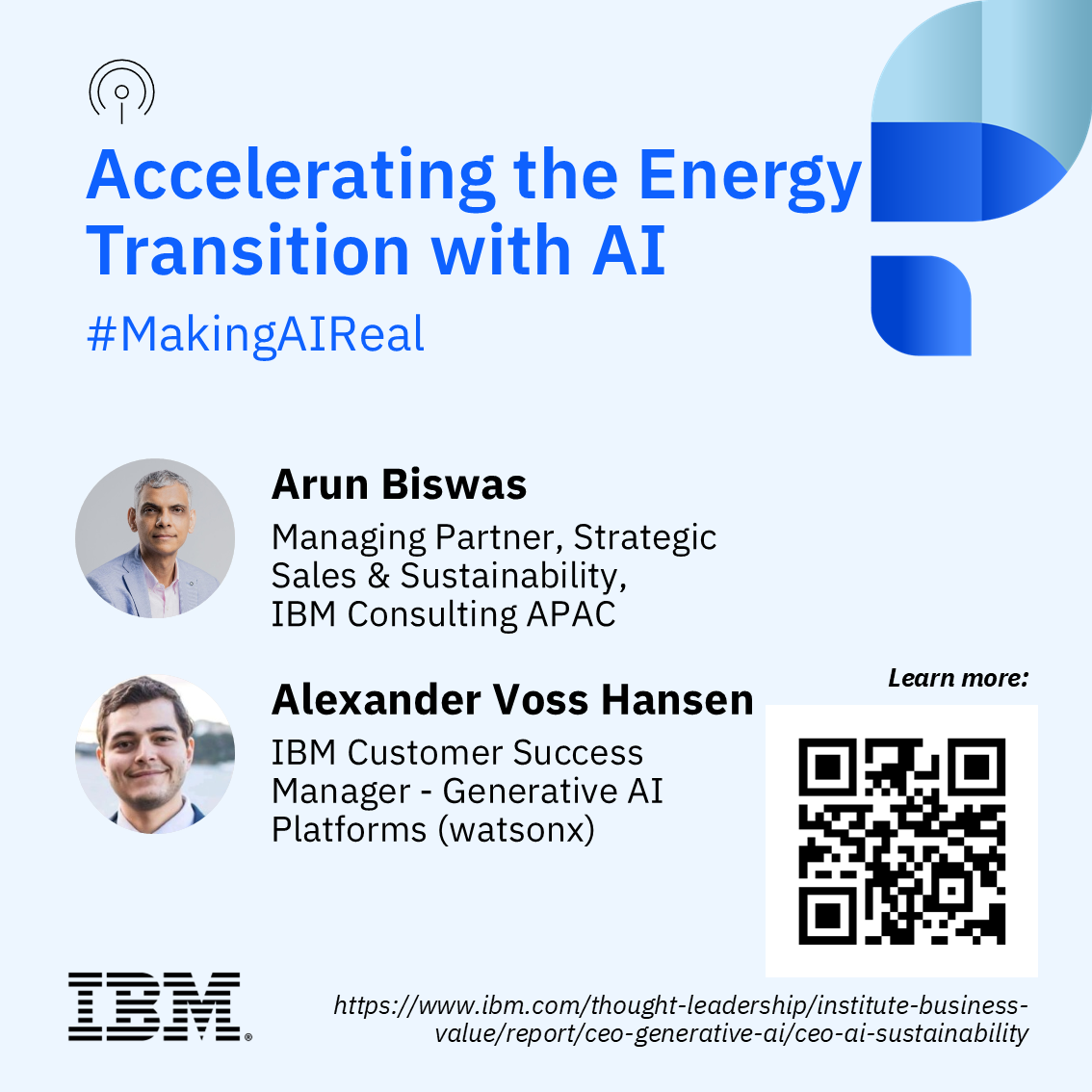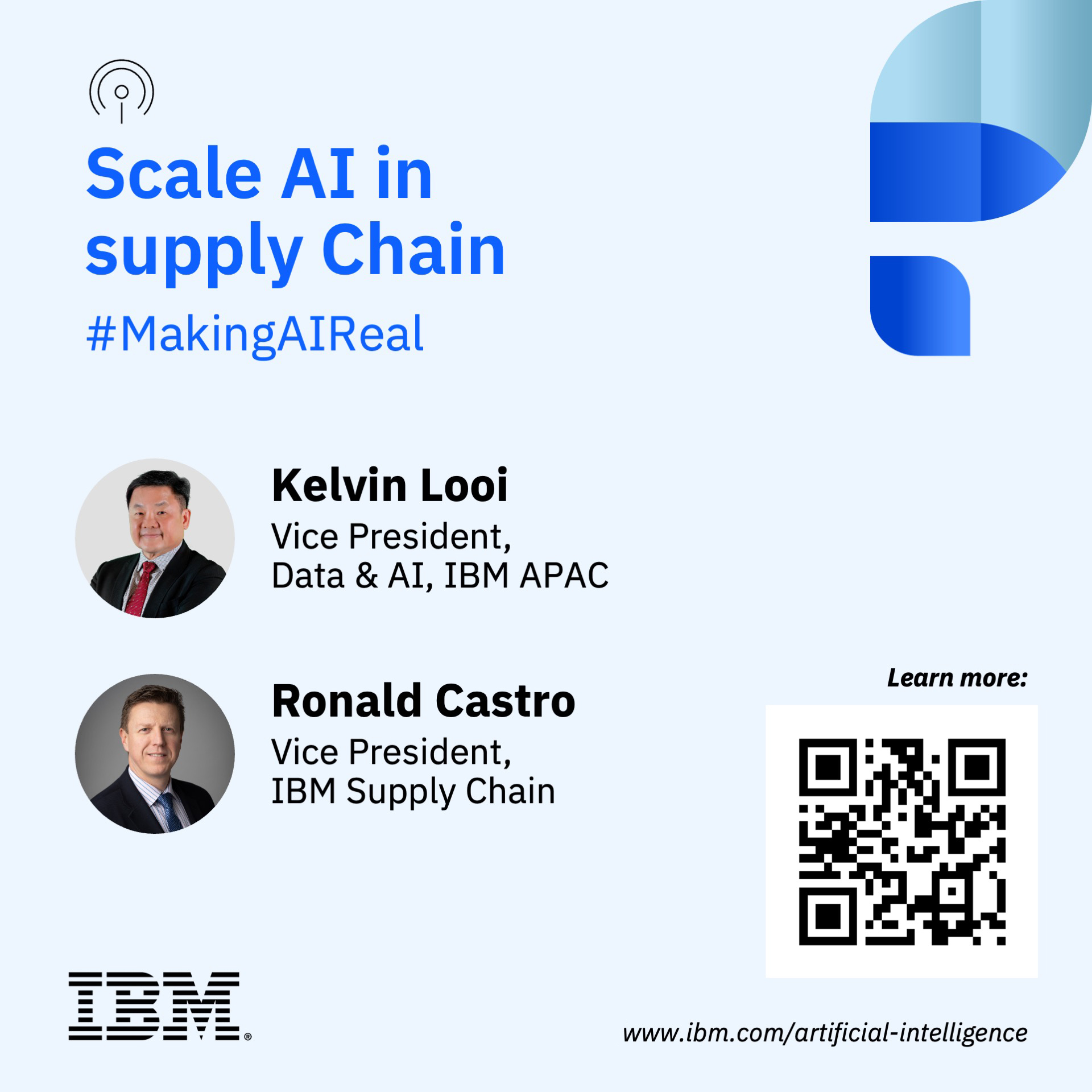Is generative AI reshaping the way legal departments work?
- 0.5
- 1
- 1.25
- 1.5
- 1.75
- 2
Simone Consigliere: Hello, everybody, and welcome to the Making AI Real podcast series. I'm Simone. And with me today is Ajay Dua, Vice President and Assistant General Counsel for IBM Asia Pacific. Welcome, Ajay!
Ajay Dua: Thank you, Simone!
Simone Consigliere: Right, let's dive right in. AI has had an impact on so many different industries and different professions. So, how do you see AI being adopted by lawyers in the legal domain?
Ajay Dua: Thank you, Simone, for the question. AI is one of the most transformative technologies-
Simone Consigliere: Oh, yes.
Ajay Dua: ...of our time. It has the potential to boost productivity and unlock immense value. No doubt, it will have a profound impact on the legal domain. Unlocking value, enhancing productivity, increasing access of legal services. Trust is the most important aspect of what a legal professional really provides, and hence, many in the legal domain are presently testing and trying and building confidence on AI tool. I would expect that there are three areas as of now, we can broadly categorize the use of AI. One is gathering facts in due diligence, in e-discoveries, in preparing chronologies. Second is in contract drafting, in summarizations of documents. The third is finding legal authority, legal analysis. Although, I must say that there have been some use cases, but there are known cases of bias and hallucination as well. Legal practitioners have professional responsibility, and hence, lawyers need to always review output, exercise judgment, validate for accuracy, and eliminate bias and hallucination.
Simone Consigliere: That's really interesting. Bias and hallucination. You talked about these three ways or three areas where AI will be applied. So, how will advances in AI change the way legal professionals work?
Ajay Dua: It is our view that the use and purpose of AI is to assist and not replace human professionals.
Simone Consigliere: That's an important point.
Ajay Dua: Yes. It is to augment human effort.
Simone Consigliere: Right.
It will help automate routine work such as document review, drafting, research analysis. AI will really go and help a lot with that. Ultimately, it will drive lawyers' efforts and focus to more high-value work. Important to mention that the work of a legal professional is unique and specialized. Though AI may drive transformational changes, but some aspects of lawyers' work may not change. And it will be interesting to see how AI really impacts aspects which are very unique to what a lawyer does, is courtroom advocacy, relationship management and trust-building with client. Intuitive instincts are so important. The critical and abstract thinking, emotional intelligence, reasoning and articulation. These are important aspects of what a lawyer and a legal professional brings on the table as part of work. So, AI, in my view, will basically make available more information and precision analysis, giving more empowerment and unlocking value. The most important aspect is building trust, which is fundamental for AI to succeed in the legal domain.
Simone Consigliere: Right. Right. And so, what I'm taking away from this is that legal professionals will focus much more on the hardware that makes the legal profession special, right? And what AI will do is take away some of the maybe routine work and maybe do some of the initial research, right?
Ajay Dua: That's right. For now, that seems to be what will really happen. And ultimately, driving lawyers to more high-value work.
Simone Consigliere: And then, on that point then, what are the legal implications about using AI in business?
Ajay Dua: Yeah. So, that's a very good point. AI has raised a lot of ethical, social and legal issues-
Simone Consigliere: Oh, yes.
Ajay Dua: ...for enterprises. Trust remains central. It remains central to success of AI. If trust cannot be built and established, it will slow down the value it can bring to business and society. I would really think that for business, three aspects are very, very important for AI to really succeed. One is accountability, which is essentially, accountability proportionate to the risk profile of the application and the role of the entity which is providing, developing and operating the AI. The second aspect is transparency, how the technology is being deployed, how it is used, and why it provides the outcomes and outputs, and how it has been trained. The third is fairness. Validation for testing, for bias and retesting, on a continuous basis is very important, especially for automated determinations and high-risk use cases.
Simone Consigliere: Right. So, when you want to build trust, then it sounds like the whole regulatory framework around AI needs to also evolve. So, what are your views on that?
Ajay Dua: Yeah. That's a very, very important aspect about how regulations, how policymakers are looking into this. We want innovation to continue, and hence, a risk-based AI governance framework, which provides an enabling environment for development and use of AI is really required. I think the important aspect is that whatever regulatory framework we have, it should be flexible and adaptable to changing circumstances, create clarity for business and individuals, harmonize other legislative and regulatory environments, and develop with robust stakeholder consultations. Proposals such as licensing in name of safety will stifle innovation, jeopardizing a sense of open ecosystem and monopolizing AI. We need an open innovation system fostering collaboration, exchange of ideas and skills. To preserve an open ecosystem, the regulatory framework should basically regulate AI risk and not AI algorithms. The context in which AI is deployed and the high-risk AI is what needs to be regulated. Second is making AI creators and deployers accountable-
Simone Consigliere: That's so important, right?
Ajay Dua: ...but not immune from liability.
Simone Consigliere: Right. Right. Accountability.
Ajay Dua: Correct. And the accountability of a deployer and a developer is different. A developer needs an ecosystem which is basically allows innovation, while a deployer is the person who is using the AI in the context of an organization and a risk. The responsibility of a deployer needs to then be different from how it should be treated with the developer.
Simone Consigliere: Yeah. Makes sense.
Ajay Dua: And then, the third most important aspect is that we should really ensure that there's an open innovation system and not licensing of AI. So, that's how we believe that the regulatory framework should really be evolving.
Simone Consigliere: Yeah. Thank you. That's really insightful. A few important points you made there. So, before we wrap up, are there any other comments you'd like to make about AI in business, AI in the legal profession?
Ajay Dua: No, I think we are at the early stage on adoption, at the stage where stakeholders are building confidence.
Simone Consigliere: It is evolving so fast.
Ajay Dua: Yeah, it's evolving very fast and it's really going to be transformative in times to really come.
Simone Consigliere: Right. Thank you so much, Ajay, for sharing your thoughts.
Ajay Dua: Thank you very much, Simone. It's important that all stakeholders are engaged in a healthy debate. The future that we have is of discontinuous change, so let's embrace AI with caution and with respect.
Simone Consigliere: I like that. Embrace AI with caution and respect. Thank you so much, Ajay.
Ajay Dua: Thank you, Simone. Thank you.
DESCRIPTION
Making AI Real | Episode 4: Is generative AI reshaping the way legal departments work?
Don't miss our latest podcast episode from the #MakingAIReal campaign series, featuring Ajay Dua, Vice President and Assistant General Counsel, Asia Pacific and China, IBM!
AI has revolutionized countless industries and professions, but what about its impact on the legal field? Join us as we delve into how lawyers are embracing AI technology to enhance their practices.
Discover the three key areas where AI is making waves in the legal landscape: from gathering facts in due diligence, contract drafting, and legal analysis. Tune in now to unlock insights into the future of AI in law!
Learn more: https://www.ibm.com/products/watsonx-governance
Today's Guests

